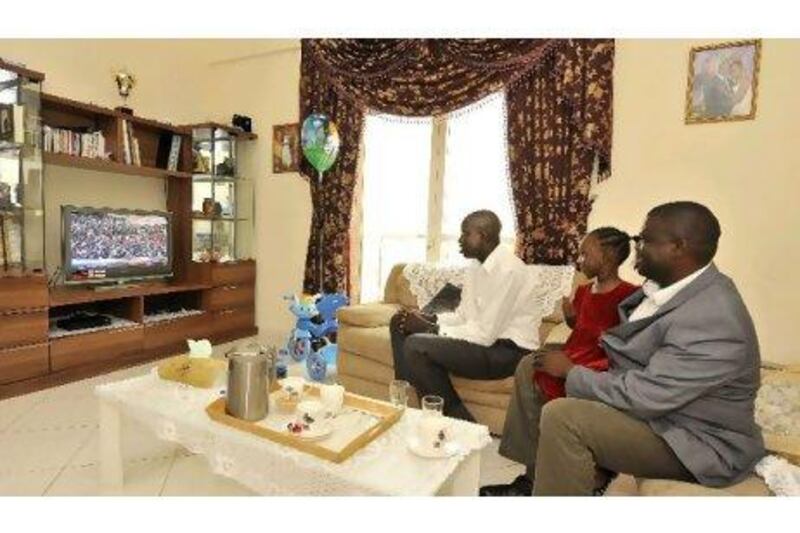DUBAI // It was a moment of sheer jubilation for Kennedy Danga and his family as they watched the flag of South Sudan being raised for the first time.
Mr Danga, 37, a structural engineer who has been living in Dubai for the past five years with his wife, Diana, and their two-year-old daughter, Gloria, wiped away tears of joy as he watched the official proceedings on television yesterday.
MORE UAE NEWS: Our pick of today's top local news stories
Federal food safety laws coming this year New federal food safety law will prioritise the threat and management of food-borne illnesses. Read article
Restaurants' charges for water 'wrong and illegal' Consumers urged to report outlets that charge more than double the supermarket price for local bottled water as mark-ups of more than 2,000 per cent are discovered. Read article
Woman sues father so she can marry An Emirati woman is suing her father because he has not given her permission to marry her would-be husband. Read article
[ MORE UAE NEWS ]
"I have been longing for it for a very long time and my parents have been longing for it too. I mean, I wish I was born in South Sudan," he said. "You have to start somewhere ... it is not going to be OK overnight or in one or two days. It is going to take some time, but I am very optimistic."
The Dangas are among the more than 70,000 estimated Sudanese in the UAE.
On this historic day, the Dangas' family friend Bona Rehan, 43 and South Sudanese, joined them in their comfortable fourth-floor apartment in an Al Qusais high-rise.
Mr Rehan acknowledges the many challenges that loom for the country and its people.
"God is great, congratulations my brother, peace," Mr Rehan said to his friend, who looked on with a smile. "They did well in the hard times, in the good times they will be willing to do more. I came here today to celebrate the joy of our new nation."
The families of both men live in South Sudan. "My family ... packed up everything and left at the time of the referendum," Mr Rehan said.
Mrs Danga's family remains in Khartoum. "I am happy of course that the south got its independence, but at the same time I am also sad," said Mrs Danga, 22, who is pregnant with their second child. "My family is still in the north and they are considering moving, but not right away. My brothers read in Arabic and in the south it is in English, so it is going to be hard for them. Their destiny is ultimately to return."
Mr Danga acknowledged the difficulties for some of the remaining families, like his wife's. "As I said it is not easy, but it is something that the people have been waiting for. Moving is not easy, people have been living in the north for a long time. All of us have friends in Khartoum and they will remain our friends."
The family watched quietly as James Wani Igga, South Sudan's parliamentary speaker, read out the declaration of independence before the new country's flag was raised and Salva Kiir, the president, took the oath of office.
Acknowledging some of the issues that the country has yet to resolve, Mr Rehan said: "We have tremendous resources that we have to turn to opportunities. All we need is just to turn the engine and go. We have to have to have good tyres, mechanics and road, as well as know the direction we are going."
Mr Danga and Mr Rehan are positive that a prosperous future lies ahead as long as resources are turned into services for the people.
"The biggest one is capacity building for the nation. You have a lot of people who have never been to school or seen a classroom, so this is going to be a problem. If we have education established properly, the future is very bright," Mr Danga said, with young Gloria on his knee. "We have a lot of educated people living abroad and the challenges for them are education and security."
Mr Rehan said a school was needed in every village and town.
"Most of the fighters have been in the war for 20 years and all they know is how to shoot," he said. "There are a lot of widows and orphans, plus the infrastructure needs to be built. We need to give people who are illiterate the opportunity to go to school."
Both men have spoken to many friends who are keen to return.
"There are many people considering going back, but it depends on individual choices. Some people have already gone and are doing well," Mr Danga said.
Mr Rehan added: "We are very fortunate because a lot of people around the world really want to help us, so we are not alone."
[ balqabbani@thenational.ae ]






